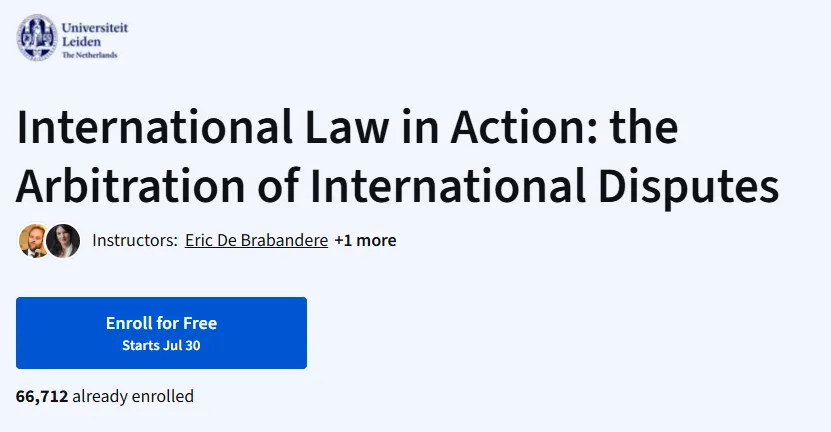What will you learn in International Law in Action: the Arbitration of International Disputes Course
Foundations of international arbitration and how it differs from domestic dispute resolution.
Key principles, legal frameworks, and conventions that govern international arbitration.
Roles of arbitrators, lawyers, and institutions in resolving cross-border disputes.
Procedures and best practices in conducting international arbitration hearings.
Program Overview
Module 1: Introduction to International Arbitration
⏱️ 1 week
Topics: Nature and role of arbitration; pros and cons; basic terminology.
Hands-on: Explore landmark cases and reflect on arbitration scenarios.
Module 2: Legal Framework
⏱️ 1 week
Topics: New York Convention, UNCITRAL Model Law, national laws.
Hands-on: Analyze key legal texts and assess enforceability of awards.
Module 3: Arbitral Proceedings
⏱️ 1 week
Topics: Commencement of proceedings, evidence, interim measures, confidentiality.
Hands-on: Map out an arbitral process from initiation to award.
Module 4: The Role of Arbitrators
⏱️ 1 week
Topics: Appointment, independence, challenges, and decision-making.
Hands-on: Case study on ethical dilemmas and arbitrator bias.
Module 5: Recognition and Enforcement of Awards
⏱️ 1 week
Topics: Enforcement across jurisdictions, resistance to enforcement.
Hands-on: Apply enforcement strategies to real-world scenarios.
Get certificate
Job Outlook
High demand in international law firms, multinational companies, and arbitration institutions.
Growth in sectors like energy, trade, construction, and tech for cross-border dispute resolution.
Salary range: Legal professionals specializing in arbitration can earn $80,000–$200,000+ annually.
Freelance arbitration roles or roles within international legal bodies are also emerging.
Specification: International Law in Action: the Arbitration of International Disputes
|
FAQs
- No prior legal experience required, but familiarity with basic law helps.
- Covers arbitration principles, procedures, and global legal frameworks.
- Suitable for students, legal professionals, and businesspeople.
- Provides foundational understanding for cross-border dispute resolution.
- Focuses on practical insights into international arbitration cases.
- Covers New York Convention and UNCITRAL Model Law.
- Explains national legal frameworks affecting arbitration.
- Highlights enforceability of international awards.
- Case studies demonstrate real-world applications.
- Prepares learners to understand cross-jurisdictional legal challenges.
- Appointment, independence, and decision-making of arbitrators.
- Ethical dilemmas and arbitrator bias considerations.
- Roles of lawyers in preparing and presenting cases.
- Functions of arbitration institutions and governing bodies.
- Hands-on exercises include case study analysis.
- Prepares for careers in arbitration, dispute resolution, and international law.
- Skills applicable in energy, trade, construction, and tech sectors.
- Enhances understanding of cross-border contracts and disputes.
- Certificate validates knowledge for professional advancement.
- Opportunities include in-house counsel and freelance arbitration roles.
- 5 modules: Introduction, Legal Framework, Arbitral Proceedings, Role of Arbitrators, Recognition & Enforcement of Awards.
- Each module: ~1 week at a moderate pace.
- Self-paced with lifetime access.
- Certificate awarded upon completion.
- Total duration: ~5 weeks.





